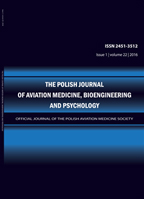2024, Volume 30, Issue 1
THE RELEVANCE OF NEUROTICISM IN FLIGHT TRAINING FOR JET AIRCRAFT PILOTS
MARCIN P. BIERNACKI1, PIOTR ZIELIŃSKI1
-------------------------------------------------------------------------------------------------
1Department of Aviation Psychology, Military Institute of Aviation Medicine
Autor korenspondencyjny: MARCIN P. BIERNACKI; Department of Aviation Psychology, Military Institute of Aviation Medicine
Full text
Streszczenie
Introduction: This study investigates the role of neuroticism in the performance of military pilot candidates, with a focus on its influence on flight training success. Specifically, it explores whether neuroticism can be a predictor of training outcomes, particularly for those selected for advanced fighter aircraft training, such as the F-16.
Methods: The analysis encompassed the data of 22 pilot candidates, among whom 10 were selected for F-16 training, while the remaining 12 were assigned to training on other aircraft types. Neuroticism scores were assessed using psychological tests (NEO-FFI and NEO-PI-R) administered prior to training, and subgroup comparisons were conducted to evaluate the relationship between neuroticism and training performance.
Results: Although the overall level of neuroticism was low in all participants (M = 4.2; SD = 1.1 on a 9-point scale), subgroup comparisons showed that candidates designated for F-16 training had relatively higher neuroticism scores (M = 4.6; SD = 1.0) than those who were assigned to other aircraft training (M = 3.9; SD = 1.2). The difference in total neuroticism score was not statistically significant (t(20) = 1.45, p = .163). Still, specific facets—such as anxiety and self-consciousness—showed medium effect sizes (Cohen’s d = 0.5–0.6), suggesting potential practical relevance despite the lack of statistical significance.
Discussion and Conclusions: The results suggest that while neuroticism may play a role in differentiating between subgroups, its influence on selection for F-16 training appears to be multifaceted. The findings highlight the need for further investigation to determine which specific aspects of neuroticism—such as emotional regulation, anxiety, or impulsivity—are most relevant for success in advanced fighter pilot training. These insights may contribute to refining pilot selection processes and enhancing training outcomes.
Słowa kluczowe
personality, neuroticism, jet pilots, flight training
